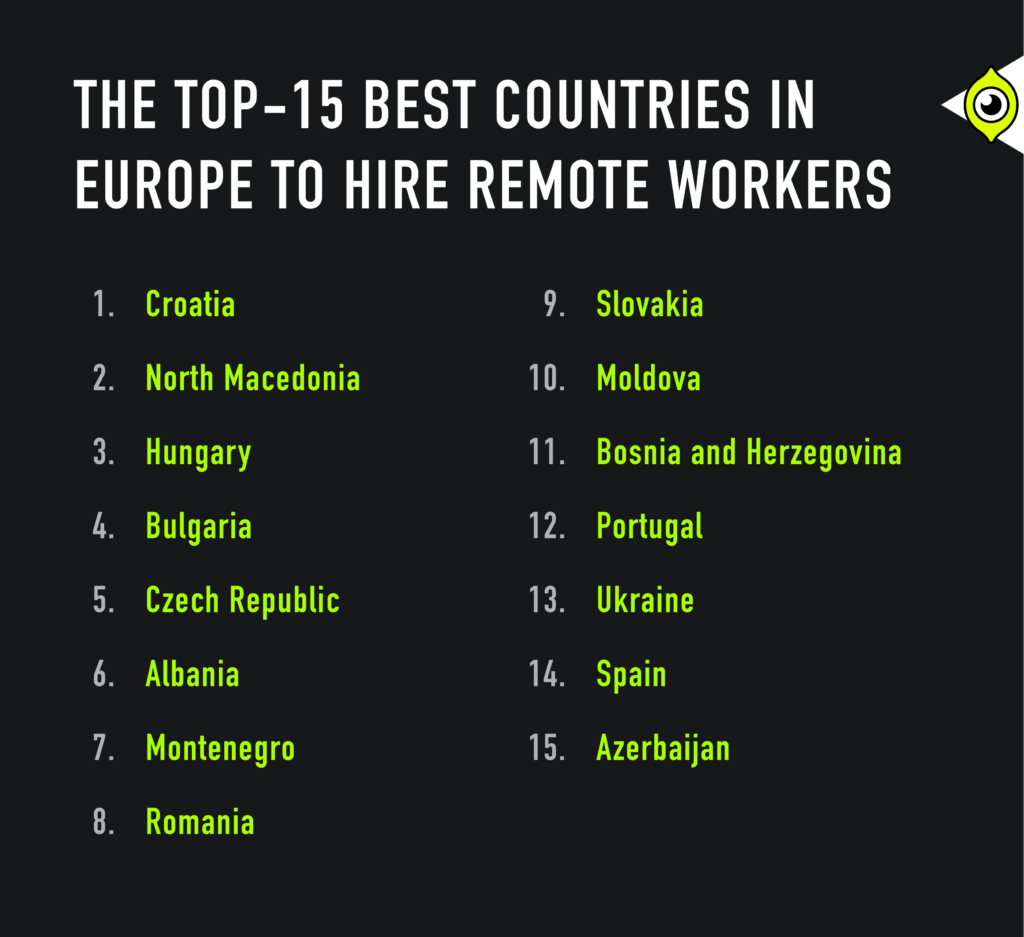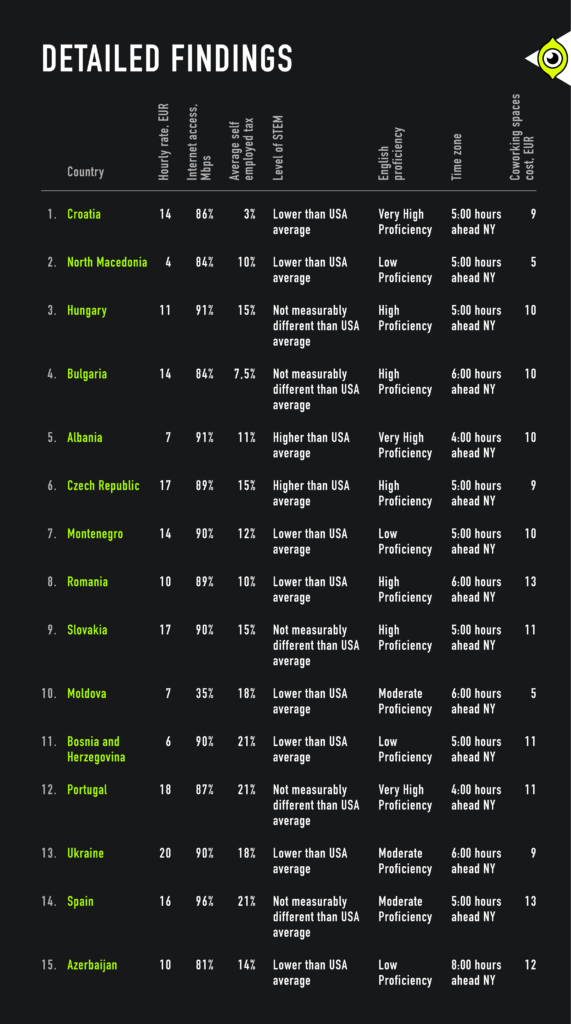Recession, hiring freezes, and layoffs are attacking businesses from all sides, but if you want to stay afloat, you still need to perform. And if you need to perform, you need people. The best solution here is to hire remotely. You save a lot of money and, at the same time, can win world-class talent for half the price. And well, we know where to hire them.

To determine the most suitable places for employment, we analyzed all European countries by seven criteria: hourly rate, average self-employed tax, internet access, level of STEM, English proficiency, time zone, and coworking space cost.
Here is what we’ve found.
First place goes to… Croatia
The leader is Croatia. Quite a low hourly rate (you can find devs for as low as 7 EUR/hour), the lowest tax for self-employed, and very high English proficiency have propelled it to the top spot. Internet access there is quite regular, as well as the cost of coworking spaces (approximately 9 EUR/hour). The time difference is not as large — five hours ahead of New York, and it’s even more of an advantage – you just got up, the code is already written, and you have half a day to work with no bursting messengers.
North Macedonia is the second. The country cannot boast a high level of STEM or English proficiency, but here you can find the most inexpensive developers with a reasonable hourly rate (the lowest being 8-9 EUR/hour).
The third place belongs to Hungary. Low hourly rate (the lowest one is 11 EUR), great internet access, an average level of STEM, and high English proficiency make this country attractive for hirers. The average self-employed tax is quite regular – 15%, as well as the cost of coworking spaces (approximately 10 EUR/hour).
Ukrainian developers are in demand despite the war
Compared to Western Europe, the hourly rate here is quite low: you can find Ukrainian web engineers for 20 EUR per hour (although for middles and seniors, the rates are higher). Global tech firms are lining up to hire Ukraine’s world-renowned coders. WhatsApp, Grammarly, Gitlab, and Solana were all founded or co-founded by Ukrainians, while Google, Samsung, and Amazon all have research and development centers in the country.
Last but not the least
Azerbaijan closes our rating. It has the biggest time difference with the US (8 hours) and low English proficiency, but at the same time, low taxes, developers’ hourly rates, and cheap coworking spaces make it a good place to find talent.
The top 15 best countries in Europe to hire remote talent:

Developers from North Macedonia and Romania have the lowest hourly rate and pay the lowest taxes. The Czech Republic is the winner of the STEM level — it’s higher than in the US. Portugal has very high English proficiency multiplied by the smallest hourly difference with the US. Spain is the leader in internet access. And if your developers need some space for their business, the best places for them are Moldova, North Macedonia, Croatia, the Czech Republic, and Ukraine. Сo-working spaces cost less than 10 euros per hour there.
The full list of the top 15 best countries in Europe to hire remote talent
Croatia

As of 2022, there are 3,101 software development enterprises in Croatia, up 0.5 percent from 2021. According to polls, 65 percent of the population speaks English as a second language, with an overall multilingual rate of 80 percent. Croatian developers are typically well-versed in new technologies and are accustomed to working freely because micromanagement is rarely tolerated in the workplace.
North Macedonia

North Macedonia is a small but beautiful country that has made great strides in reforming its economy over the last decade. The total ICT market value in North Macedonia was an estimated $1 billion in 2021, making the IT industry one of the most profitable and prosperous industries in the tiny Balkan country.
While IT service and software comprise the largest segment (56 percent of the ICT market) in North Macedonia, the country is also home to many skilled IT professionals who mostly work for domestic or international IT companies. The lowest wages in Eastern Europe, a large pool of qualified IT experts, and the perfect business climate make this country one of the best destinations for software outsourcing and staff expansion needs.
Hungary

Hungarian developers make software for antivirus and IT security services, attracting large companies such as Lufthansa, IBM, EPAM Systems, Microsoft, Nokia, and HP. Many European countries prefer Hungarian development companies, which have already established themselves as a well-qualified market offering quality software development services.
Bulgaria

Bulgaria’s software development market consists of 24,000 professionals who work in 400 companies. The country has a rather high number of R&D offices of global software engineering corporations such as HP, SAP, Johnson Controls, Oracle, CISCO, and ProSyst. About 80% of outsourcing companies and specialists live in Sofia (the capital city).
Czech Republic

The local software industry reached $1.33 billion in 2021 with a 4% annual growth rate. Moreover, the Fitch Solutions research shows that digital transformation should help the IT market outpace the country’s GDP growth until 2026.
There are over 7,700 software and IT companies in Czechia, many of which are spread over three major IT hubs — Prague, Olomouc, and Brno. There is also a lot of freelance developer talent in Czechia.
Albania

Albania is a developing country with a modern open-market economy, where IT technology is the fastest-growing sector. Hardware is the largest segment, with 55% percent, the ICT market in Albania is the second-largest segment, with 30%, and software represents 15% of the ICT market.
Some advantages of Albania are skilled and low-cost workers with normal English skills and ICT-related education, a good infrastructure, and low corporate taxes. The sector has constant growth and supplies other countries with well-educated IT professionals. There is also a large pool of remote developers in Albania.
Montenegro

This tiny Balkan nation claims to be a free market economy. It has one of the best tax regimes in Europe, an excellent banking system, and a new citizenship-by-investment program with great potential. In addition, the country has a well-developed financial industry. The cryptocurrency market has grown significantly over the past few years.
Montenegro has become a habitual place for IT people to live. There are both freelancers and those who work for hire but remotely.
Romania

Romania’s IT sector is one of the top 3 in Central and Eastern Europe. Bucharest houses more than 185,000 tech companies, including multinationals such as Microsoft, IBM, P&G, HP, Oracle, Wipro, and S&T.Economy. Bucharest is also an important R&D hub, home to facilities opened by tech giants such as Amazon, Redis Lab, and Fitbit.
Coders in Romania are well-educated because of the variety of education options in Romania and the European Union. Every year the country graduates 10,000 engineering specialists. Also, they have no payroll income taxes and the lowest salaries in the CEE, which makes it one of the most financially attractive IT hubs in Europe.
Slovakia

Slovakia’s strategic location in Central Europe, well-versed and adaptable workforce, competitive wages, investor-friendliness, and attractive business environment are the key factors that result in this country being among the top destinations for business offshoring. Slovakia offers a ripe tech talent base, affordable office spaces, and a well-organized business environment. Major tech companies, including AT&T, Lenovo, Dell, and IBM, already have their offices in Bratislava.
The emerging Slovak IT sector has over 50 thousand IT specialists who live in Bratislava, Kosice, Zilina, Trnava, and Nitra, with the vast majority located in the first two (as their tech scenes are more elaborated). Needless to say, there are a lot of Slovakian developers you could potentially add to your team.
Moldova

Moldova is a promising and fast-growing IT area with many young, driven, ambitious developers with immense experience and plummy portfolios. It is full of specialists in data analytics, UI/UX design, software development, application, mobile software development, and even data visualization. Don’t forget a great location, reasonable salaries, and outstanding educational level.
The IT industry in Moldova employs around 12,500 people. Most of them are involved in the export of services meaning that they are engaged with outsourcing and outstaffing companies that hire programmers for foreign companies.
Bosnia and Herzegovina

Bosnia and Herzegovina is an upper-middle-income country that has accomplished much since the mid-1990s. The level of education in Bosnia and Herzegovina is high, especially in key areas such as engineering and technology. The talent pool is deep, and English is widely spoken.
Currently, the IT sector in Bosnia and Herzegovina generates about 255 000 000 EUR annually, and employees have an average salary much higher than the national average. However, compared to the rest of Europe, hourly rates are very low here. Because of those low rates, developers from Bosnia and Herzegovina are in high demand.
Portugal

Portugal is becoming a tech hub for local and international companies now sprouting in its capital city. Lisbon is home to notable global businesses, such as Uber, Mercedes, Google, Cisco, and Volkswagen.
Portugal has a pool of highly skilled and technology-savvy professionals who can help your company grow through expertise. There are more than 131,000 developers in the Portuguese software development industry, while the number of businesses offering this service is 4,069.
Ukraine

At the end of 2021, there were 8.2 thousand active legal entities in the Ukrainian IT market. Thus, the market includes about 5,000 local companies and nearly 130 global offices and research centers, such as Microsoft, Magento, Amazon, Samsung, etc.
Ukraine is one of Europe’s largest exporters of IT services, with an excellent knowledge base, great motivation, and ample opportunities. Officially, there are about 285 thousand IT specialists in Ukraine, which increases by 25-30% annually.
Despite the war and its challenges, the IT sector remains a driving force in Ukraine’s economy and is expanding rapidly. The contribution of this industry to the country’s GDP is gradually growing.
Spain

Spain is one of the largest economies in the European Union, where the IT sphere plays a very significant role. Spain’s software development industry’s market size increased faster than the economy overall. The market size of the industry will be €13.7bn in 2022. There are 100,822 people employed in the software development industry as of 2022, and lots of remote developers in Spain to offshore work to.
Azerbaijan

IT outsourcing in Azerbaijan is gaining momentum. Although there aren’t many rapidly-advancing software development companies in the country, around 20, hundreds of those are gradually becoming more successful. The startup ecosystem is still developing, so various funds are helping these young companies attract investments and get a chance to grow. Although there aren’t many programmers in the country, around 3,000, this number is constantly growing.
How to hire from these countries
As you can see, there are many options — so choose your remote developers wisely, evaluating their soft and hard skills, proficiency level, and experience in remote work.
We at Lemon.io help startups find talented engineers from almost all the countries from the above-mentioned list — carefully picking only the best and the most proficient candidates with 3+ years of remote work experience. All the programmers we offer have a strong mid-level or senior-level proficiency, good working command of English, and outstanding communication, empathy, and time management skills. Besides, the hiring process at Lemon.io is extremely convenient for all sides: we can offer you the first candidates in 2-3 business days after the introduction call, where you explain us your needs and requirements.
Detailed findings and methodology
To create this research, researchers at Lemon.io analyzed a range of publicly available data from Glassdoor, English Proficiency Index, TravelMatch, and Statista.











